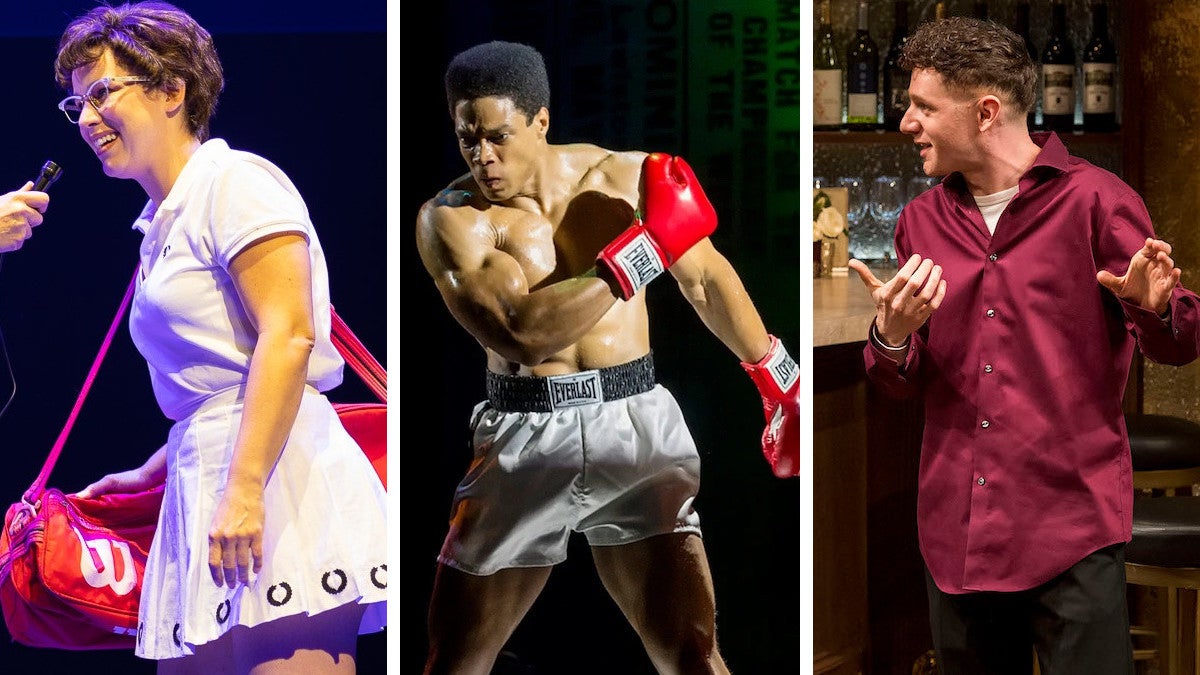
It seemed the whole world watched when Billie Jean King defeated Bobby Riggs. When LeBron James went for the all-the scoring record, even non-NBA viewers were caught up in the chase. And just about every punch in Muhammed Al’s decorated career was chronicled for the world’s enjoyment.
When it comes to the sports world’s biggest, most dramatic moments, there is a certain larger-than-life theatricality to the athletes and their work that many have long tried to capture onstage — often to mixed results.
So far, plays about, well, players have had mixed critical and commercial success. “Rocky the Musical” was a financial failure, known, in the end, for its set, which in the final act featured a boxing ring that extended out into the orchestra. “At last, after two lackluster hours, ‘Rocky’ finally delivers suspense, excitement, drama!” TheWrap’s Robert Hofler wrote at the time.
But such misfires as “Rocky” 10 Broadway seasons ago haven’t deterred theater makers from continuing to zero in on some of sports’ greatest figures — and times might be changing for the better, at least if this past season is evidence. Audiences just filled the La Jolla Playhouse for a show called “Love All,” about the life of Billie Jean. And they flocked to the Kirk Douglas Theater in Culver City, where Debbie Allen directed Will Power’s play, “Fetch Clay, Make Man” — both of which wrapped their runs earlier this month. The latter drama is about the boxer Cassius Clay, who would become Muhammed Ali, and a little-known friendship he enjoyed. “King James,” which recently played at Off Broadway’s Manhattan Theatre Club, tells a story about NBA royalty, as in King LeBron James.
Fortunately, those are all plays helmed by top playwrights who realize the limitations of the sports stage genre. Producer Harriett Leve’s coup was landing Anna Deavere Smith (“Twilight”) to write “Love All.” Smith cleverly divided the play into vignettes from key decades: Billie Jean as a child with a big serve and bigger ambitions; Billie Jean as a six- time Wimbledon singles champion; Billie Jean as the main proponent behind Title 9; and Billie Jean as a founder of The Women’s Tennis Association, which gave professional women equal pay. Little is left out, including her complicated relationship with her sexuality.
In “Fetch Clay, Make Man,” the script by Will Power (who New Y0rk Magazine heralded as “the best verse playwright in America”) explores the improbable bond that formed between Cassius Clay and vaudevillian, comedian and actor Stepin Fetchit as the boxer prepared for one of his biggest fights — two men remembered as drastically different and influential cultural icons of the 1960s. (Ironically, “Fetch Clay, Make Man” was commissioned by LeBron James’ Spring Hill company).
“Years ago, I saw a book about Muhammed Ali in an African American bookstore,” Power told TheWrap of his deep-dive on his subject. “There was a photo of him with Stepin Fetchit. One was the epitome of manhood, the other who played stereotypes that denigrated our race. But in the book, he was named Ali’s ‘secret strategist.’”
Allen — one of our great choreographers — said the project grabbed her immediately as a director. “I had no idea about this story and this relationship,” she said, “but mostly, the writing was so extraordinary. It sings like a song. The issues it deals with — race, identity and religion, are the fabric of everything we talk about today. And hey, what are basketball and boxing but forms of dancing?”
It seems the staged sports dramas that work are ones that move beyond the scoreboard. Pulitzer Prize finalist Rajiv Joseph (“Bengal Tiger at the Baghdad Zoo”) has taken “King James” from Chicago to Los Angeles to New York. A native of Cleveland, he didn’t feel a bio-play of James would be adequate, so it became a play about a male friendship centered on James and his sport.
“LeBron was a presence in my life for some 20 years,” Joseph said. “I was interested in his impact on the city and how it erupted when he came, when he left, when he returned. His is a tempestuous and yes, dramatic, story.”
One of the two leads (the second being “Abbott Elementary” star Chris Perfetti) was Glenn Davis, an actor who also serves as the artistic director of Chicago’s famed Steppenwolf Theatre. He believes basketball is not inconsequential in the show, but that it represents a lot more than the action on the court.
“It is also about a particular brand of fandom,” he said. “People come to blows over sports, but they may in fact be expressing other things. People change religions more often than teams.”
Any successful sports stage drama should be taking notes from Broadway’s Tony-winning “Take Me Out.” Getting men and women alike to commit to an athletic-based show can be a challenge, but that was not an issue for Richard Greenberg’s play, which recently finished its third Broadway run.
A clever, touching piece about a baseball star’s revelation that he’s gay, “Take Me Out” also spotlighted the other side of the sports field — the locker room. Audiences had to check phones before entering the theater due to full-frontal male nudity. It served as a scintillating promise for curious theatergoers — but ultimately acted as a Trojan horse for its themes of acceptance, which any non-sports fan could relate to.
And how about those Yankees? We’ve had some regrettable Broadway bombs centered on the Big Apple’s hometown team — the less said of 2014’s four-week run of “The Bronx Bombers,” the better. But arguably the most successful sports-related production in history was “Damn Yankees,” which won Best Musical and was adapted many ways, many times. It dealt with a rabid fan who literally sold his soul to the Devil to see his team win.
Hopefully, theater folks with dreams of making sports stories relatable and successful, won’t have to sell their souls, too.
Michele Willens reports on theater and hosts “Stage Right… or Not” on an NPR affiliate.
















